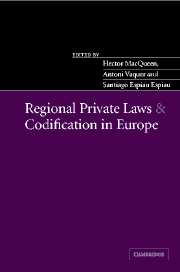Book contents
- Frontmatter
- Contents
- List of contributors
- Acknowledgements
- List of abbreviations
- Introduction
- 1 The civil law in European codes
- 2 ‘A token of independence’: debates on the history and development of Scots law
- 3 The Scottish civil code project
- 4 Scots law in Europe: the case of contract
- 5 Scottish property: a system of Civilian principle. But could it be codified?
- 6 ‘… Quae ad ius Cathalanicum pertinet’: the civil law of Catalonia, ius commune and the legal tradition
- 7 The codification of Catalan civil law
- 8 Unification of the European law of obligations and codification of Catalan civil law
- 9 From revocation to non-opposability: modern developments of the Paulian action
- 10 Epistle to Catalonia: romance and rentabilidad in an anglophone mixed jurisdiction
- 11 Estonia and the new civil law
- 12 The positive experience of the Civil Code of Quebec in the North American common law environment
- 13 From the code civil du bas Canada (1866) to the code civil Quebecois (1991), or from the consolidation to the reform of the law: a reflection for Catalonia
- 14 The evolution of the Greek civil law: from its Roman–Byzantine origins to its contemporary European orientation
- Index
12 - The positive experience of the Civil Code of Quebec in the North American common law environment
Published online by Cambridge University Press: 30 July 2009
- Frontmatter
- Contents
- List of contributors
- Acknowledgements
- List of abbreviations
- Introduction
- 1 The civil law in European codes
- 2 ‘A token of independence’: debates on the history and development of Scots law
- 3 The Scottish civil code project
- 4 Scots law in Europe: the case of contract
- 5 Scottish property: a system of Civilian principle. But could it be codified?
- 6 ‘… Quae ad ius Cathalanicum pertinet’: the civil law of Catalonia, ius commune and the legal tradition
- 7 The codification of Catalan civil law
- 8 Unification of the European law of obligations and codification of Catalan civil law
- 9 From revocation to non-opposability: modern developments of the Paulian action
- 10 Epistle to Catalonia: romance and rentabilidad in an anglophone mixed jurisdiction
- 11 Estonia and the new civil law
- 12 The positive experience of the Civil Code of Quebec in the North American common law environment
- 13 From the code civil du bas Canada (1866) to the code civil Quebecois (1991), or from the consolidation to the reform of the law: a reflection for Catalonia
- 14 The evolution of the Greek civil law: from its Roman–Byzantine origins to its contemporary European orientation
- Index
Summary
Presentation
The Civil Code of Quebec occupies a special place on the North American continent. Quebec is virtually the only state in North America to be endowed with a civil code in a juridical environment almost wholly dedicated to Common Law. In our opinion, Quebec's historical development and dynamic current show that a small state's civil code is capable of developing itself and becoming the prime source of inspiration in the private law of the citizens of a community, even though such a community represents a minority within a broader setting.
Moreover, far from being a cause of legal acculturation and cultural alienation conflicting with Quebec's civilist culture, the coexistence of Common Law and Civil Law in Canada has been, from the very beginning of Quebec's history, a unique opportunity to benefit from a good number of innovations and unique institutions drawn from one or the other legal tradition. Very few countries have the good fortune of being at the bridge of two great juridical traditions as rich as the French-inspired Civil Code and the British-inspired Common Law. However, in the very near future, the globalisation of economic markets, as well as the move towards legal harmonisation, namely in the context of the North American Free Trade Agreement (NAFTA) and the Canadian Agreement on Internal Trade, will have to be monitored closely to ensure the continuity of our most fundamental legal institutions, especially the Civil Code of Quebec.
- Type
- Chapter
- Information
- Regional Private Laws and Codification in Europe , pp. 260 - 266Publisher: Cambridge University PressPrint publication year: 2003
- 1
- Cited by



